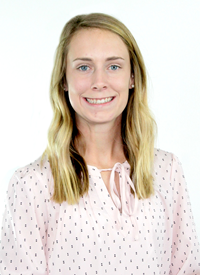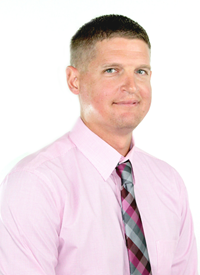William Jewell College athletic training keeps athletes strong on and off the field. Charlie Miller and Brooke Powers, two of the athletic trainers here at Jewell, gave insight into the ways they keep athletes healthy, prevent injury and help them regain strength after surgery and various injuries.
Miller explained some of the ways that trainers help athletes with injuries and preventative treatments.
“Jewell Sports Medicine helps athletes with injuries by being present at practices and games. Sports Medicine team are the first to evaluate injuries and start the treatment plan. We are fortunate to have great physicians that dedicate their time to William Jewell by coming out for weekly clinics and game coverage. Preventative treatments range from light band work to stretching and taping. We are very fortunate to have a great strength and conditioning staff that helps prepare our athletes in all aspects,” Miller said.

Assistant Athletic Trainer Brooke Powers
Powers discussed in more detail some of the more common injuries that the trainers encounter.
“Longest injuries that take to heal are typically surgical injuries, and any type of ACL or labral tear in the shoulder or hip, bone fractures and they take about six to eight months of recovery time. Whereas if it’s as muscle strain it typically takes six to eight weeks. Common injury usually just depends on the sport. Lower body sports we tend to see more lower body injuries and vice versa with upper body sports,” she said.
Jewell athletic training does not just focus on healing athletes physically. It also provides mental and emotional support. Regardless of the severity of the injury the athlete may need mental and emotional support to push through physical therapy. It can be devastating news for an athlete to have a significant injury, need surgery or just have an acute injury that hinders play.
When Powers was asked her favorite thing about being a trainer, she discussed this all-around supportive role.
“The job is a lot more than making sure they’re not just physically able to do their sport, but it’s pretty emotional when they are told that they are having surgery, and you’re going to be out eight months. It’s my job to also help them cope with that. Seeing them step onto the field for the first time after an injury whether it’s significant or not is an amazing feeling,” she said.

Head Athletic Trainer Charlie Miller
Miller shared his favorite thing about being a trainer.
“My favorite thing about being an athletic trainer is getting to spend time with the student athletes and help care for their injuries. Having the opportunity to help an athlete recover from a surgical procedure and return to the field is a great experience and very rewarding. Additionally, rehabilitation techniques are continually evolving and I have the opportunity to continue to learn and grow,” he said.
Photos courtesy of Jewell Athletics.
